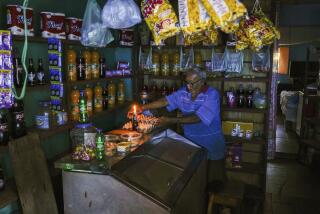Nigerian Strike Spreads, Crippling Oil Production
- Share via
LAGOS, Nigeria — Business ground to a halt and strikers threatened Nigeria’s oil exports Tuesday in the most dramatic show yet of opposition to Gen. Sani Abacha’s military regime.
Almost all business stopped in Lagos, nerve center of the economy and home to 5 million people. Armed police patrolled the city streets. Workers were reported staying home in several other cities in southern Nigeria, where opposition to the dictatorship is strongest.
The stay-at-home strikes cut across all sectors in Lagos and were even honored by federal employees, despite threats from Abacha. Banks closed, buses and ferries stopped running, and people walking to work found their offices empty.
Most of Nigeria’s commercial activity and all of the West African nation’s petroleum fields, which provide 80% of government revenue, are in the south. The growing fuel shortage has caused blackouts and water cuts in Lagos.
Since seizing power in November, Abacha has dissolved elected governments and jailed dozens of journalists, human rights activists and politicians, including the apparent winner of the 1993 presidential election, Moshood K.O. Abiola.
Most oil workers went on strike July 4 to demand Abiola’s release and Abacha’s ouster. Oil company managers at the Warri refinery in southwestern Nigeria joined the strike Monday, shutting down production and crippling the nation’s major source of revenue.
Kenneth Narebor, deputy general secretary for the Petroleum and Natural Gas Senior Staff Assn., said pipelines at two of the biggest export terminals, off southern Port Harcourt and Warri, would run dry by today or Thursday.
Abacha appeared on television late Monday and said, “All apologists of civil disobedience will be severely dealt with.” Last week, his government said anyone who interfered with the military’s attempts to keep the oil industry going would face the death penalty.
The strikes, which are in large part economically driven, represent the biggest challenge to the military government since similar actions forced out Abacha’s predecessor, Gen. Ibrahim Babangida, last August.
More to Read
Sign up for Essential California
The most important California stories and recommendations in your inbox every morning.
You may occasionally receive promotional content from the Los Angeles Times.










